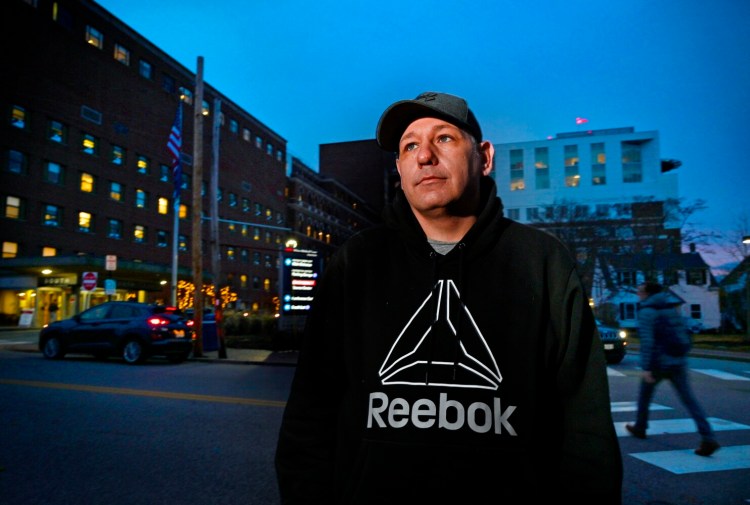Bettina Lerman is slowly recovering, breathing mostly on her own now after spending five weeks on a ventilator at Maine Medical Center in Portland after contracting COVID-19.
“Feeling better,” Lerman said Monday during a visit by her son. A cellphone video shows her in bed but awake and alert.
She nearly didn’t make it. Her son Andrew Lerman Jr. said the family was preparing to give doctors the OK to take their 69-year-old mother off life support a few weeks ago, and were picking out gravestones for her burial.
“It was literally down to the wire,” said Lerman, who lives in Florida. He said the day they were making final plans to take her off the ventilator, she woke up from a medically induced coma. “It was Oct. 29. If she hadn’t woken up that day, she wouldn’t be here.”
Lerman was one of 296 patients hospitalized for COVID-19 in Maine on Monday, more than at any time during the pandemic. Of the 296 people hospitalized with COVID-19, 87 were in intensive care and 36 were on ventilators. Maine has set multiple hospitalization records during the past week, including on Wednesday, Sunday and Monday.
Lerman has been at Maine Med since Sept. 12, her son said. After waking from the coma, she spent a few weeks on a ventilator, and now is able to breathe on her own, with some supportive oxygen, he said.
“Every day, she’s doing better and better,” Lerman said. “She’s doing phenomenal.”
A Maine Medical Center spokeswoman said she could not confirm details about Bettina Lerman’s case, which is consistent with the hospital’s practice when it does not have explicit permission from a patient to speak with the media.
Family members have been sharing updates about Lerman in media interviews and posts online. The Press Herald interviewed Andrew Lerman Jr. on Monday, when he was in Portland to visit his mother.
Lerman said his mother was living in Tavares, Florida, and was visiting her ex-husband, Andrew Sr., in South Portland when the entire family caught COVID-19. No one who contracted the virus was vaccinated. He said his mother has underlying medical conditions, including diabetes and a heart condition, that put her at greater risk of severe illness.
Lerman said his mother wasn’t against vaccines, but hadn’t gotten around to scheduling the shot yet. But now, after the near-death experience, they all plan to get vaccinated as soon as they are cleared to do so.
“We are going to get the vaccine. Obviously, it helps,” Andrew Lerman Jr. said. “It was an eye-opening experience. It’s a horrible virus, and hopefully people can learn from this.”
He said because they believed their mom was going to die, they closed her lease in Florida and donated most of her belongings. The family is hosting online fundraising to help defray the costs from her ordeal.
The record number of hospitalizations on Monday comes as case counts also have been hitting record levels, suggesting hospital admissions may continue to rise. The Maine Center for Disease Control and Prevention will release updated case numbers on Tuesday.
Maine has the 12th-highest rate of COVID-19 in the nation, with 50.2 cases per 100,000 population, on a seven-day daily average, according to the Harvard Global Health Institute. The national average is 28 cases a day per 100,000 people.
Maine’s fall surge of cases and hospitalizations is primarily among unvaccinated people, who make up about two thirds of all hospitalized patients. Pockets of the unvaccinated, especially in rural Maine where vaccine uptake lags, is primarily driving the fall surge, public health experts have said.
“Vaccinated adults have a nine times lower risk of hospitalization than unvaccinated ones,” Dr. Nirav Shah, Maine CDC director, said in a tweet on Sunday. “Does vaccine eliminate the risk? No. But it significantly lowers it, which is what they are designed to do.”
Maine is now administering about twice as many vaccines per day – about 11,000 to 12,000 daily – compared to late October. In November, federal regulators approved vaccines for ages 5 through 11, and last week eligibility for boosters was expanded to everyone 18 and older.
Since vaccines were approved for elementary schoolchildren, 23 percent of children 5-11 have received their first dose, including 40 percent of that age group in Cumberland County. In contrast, less than 10 percent of children 5-11 have gotten their first dose in Washington, Franklin, Piscataquis and Somerset counties. Of those who already have received their first dose, second doses will be given in mid-December, and those children will be fully immunized before the end of the year.
Note: This article was updated Tuesday, Nov. 23 to remove an incorrect description of a medical device providing nutrition to Lerman.
Comments are not available on this story.
Send questions/comments to the editors.



